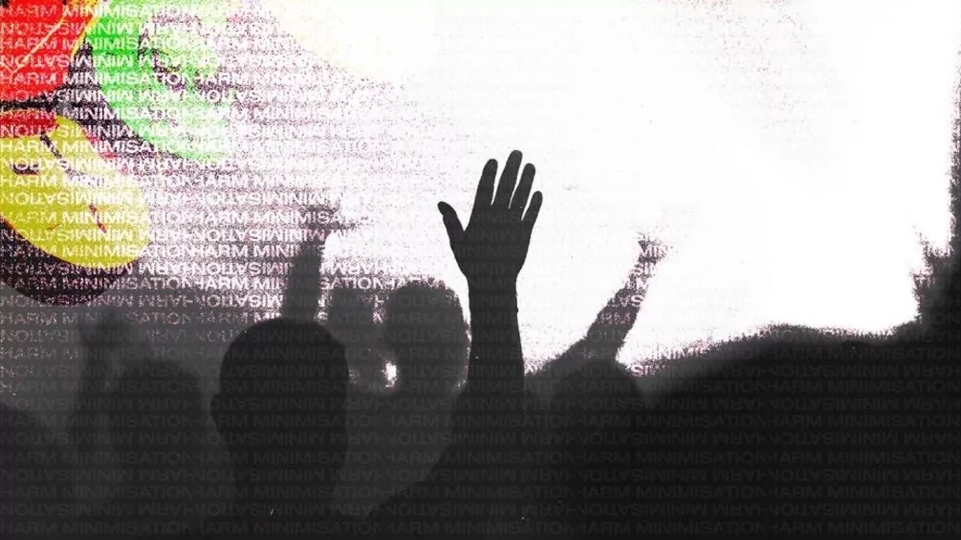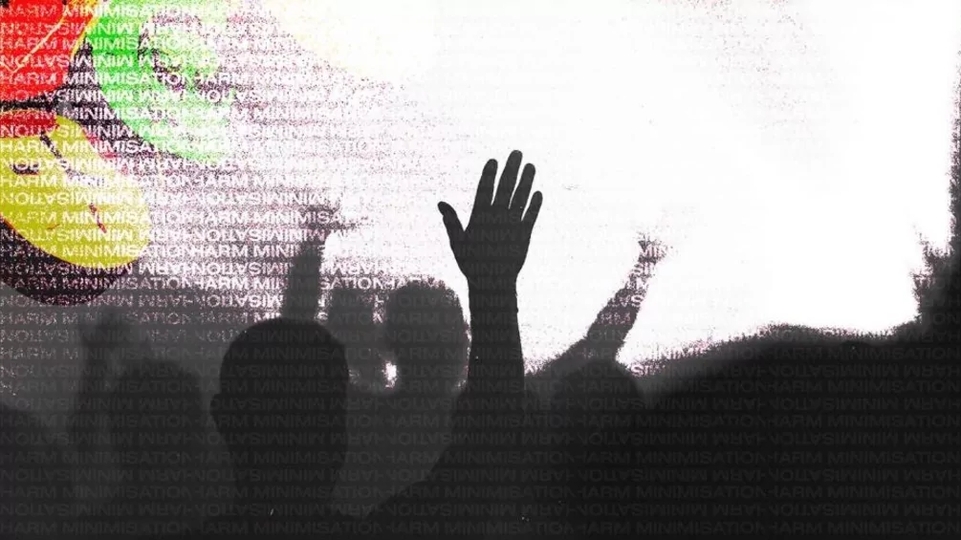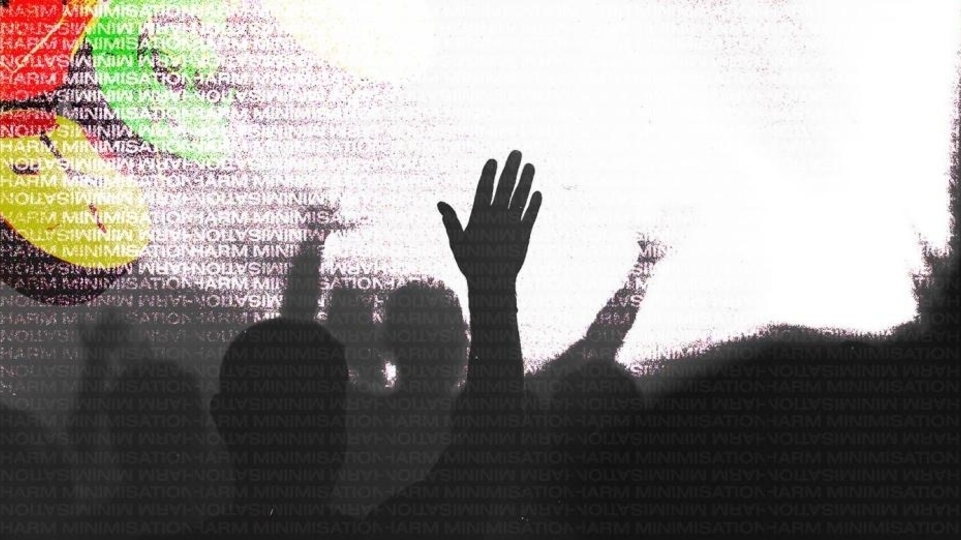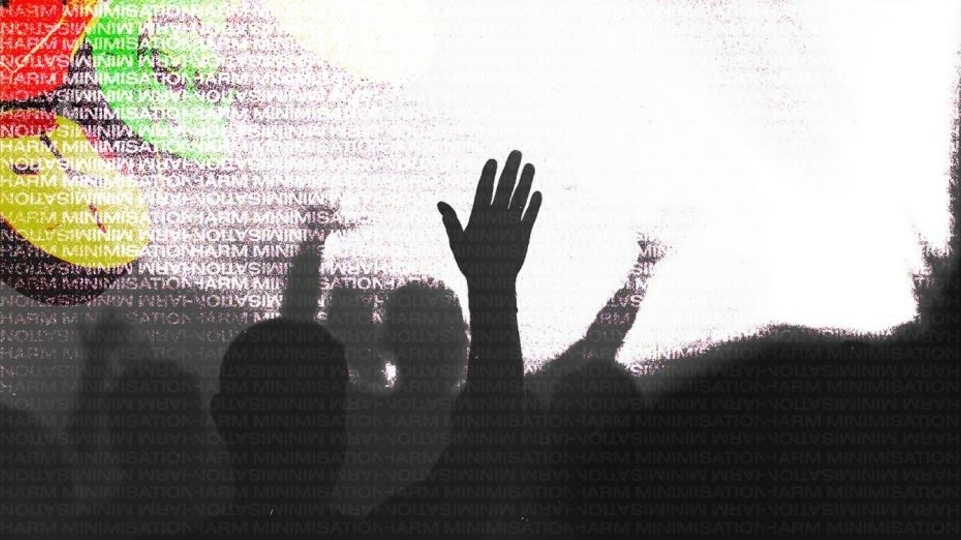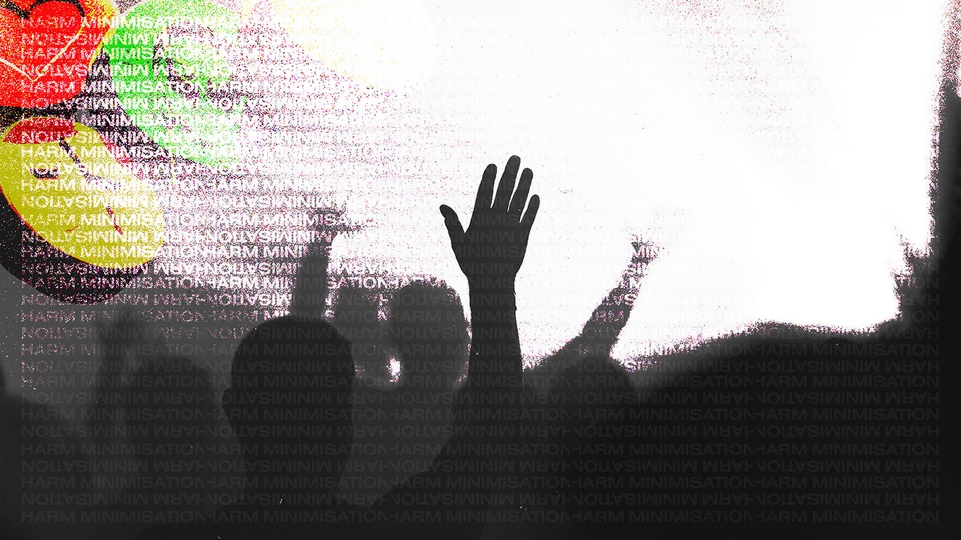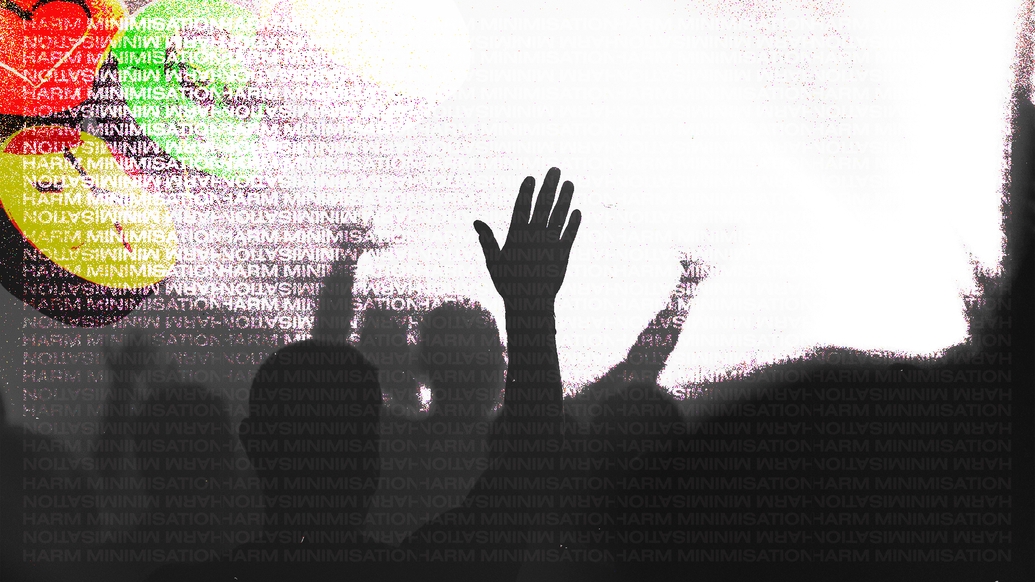
Drug harm minimisation is more important for UK clubs than ever — the policies around it need to change
The summer of 2021 has seen a perfect storm of drug-related risks hit the UK dance scene: from an abundance of first-time ravers who turned 18 during lockdown, or seasoned partiers going in hard after an 18-month absence, to disrupted drug supply chains and political intransigence. Ed Gillett investigates, finding that UK drug-takers’ safety is being left to a non-governmental patchwork of underfunded charities and volunteers, while heavy-handed policing leaves many people fearing getting help, when more progressive approaches — like those already implemented in The Netherlands or being advocated for in the UK — could ultimately save lives
Ever since the birth of acid house in the late ‘80s, UK dance music has been defined, legislated against and demonised on the basis of its proximity to illegal drug use. From tabloid scare stories about feral mobs of bug-eyed ravers, to the horrifying images of Leah Betts on her deathbed, or more recent warnings about sinister batches of blue Tesla pills, moral panic over drug use has repeatedly been the lens through which mainstream British public opinion has understood (or misunderstood) dance music and its associated subcultures.
Acutely conscious of the average Daily Mail reader’s views on the subject, the UK Government’s stance on illicit drug use remains stuck somewhere between the 1950s and the Victorian era: illegal substances are impossibly dangerous, we’re told, so the only conceivable way to manage the harms associated with them is to never take any of them, under any circumstances.
As with much else in the 50 years since the War on Drugs was first declared, a reliance on prohibitive moral posturing and indiscriminate scaremongering has done little to stem demand for illegal intoxicants, or deal with the realities of drug-related harm. The Office for National Statistics estimates that in the year to March 2020, over three million people in the UK took illegal drugs, including 21% of all 16 to 24 year olds, while over a third of all British adults are said to have indulged at some point in their life. Following steady decreases in drug use between 1995 and 2013, our collective chemical intake has been creeping steadily back up, with drug-related offences and deaths increasing accordingly: the 4,500 fatalities caused by drugs in 2020 represents a 4% increase on 2019, and the highest number of deaths since records began in 1993. By way of comparison, around 7,500 deaths in the same year were linked directly to alcohol consumption, and somewhere between 12% and 15% of all NHS hospital admissions are alcohol related. Despite this, the nation’s drinking habits fail to attract anything like the same level of frenzied media coverage, or political demands for blanket prohibition.
Longer-term shifts in drug use have been exacerbated by a host of newer issues caused by the lifting of Covid-19 restrictions, creating a “perfect storm” of risks over the summer of 2021, according to Fiona Measham, director of the drug-checking charity The Loop. Tragically, within the first few weeks of dancefloors reopening in July, a spate of drug-related deaths linked to venues in London and Bristol were reported.
Sorcha Ryan is the festival and nightclub harm reduction lead at the Bristol Drug Project, and has seen these issues collide in real-time across the city. “During the opening weekend there were definitely more drug-related incidents related to the night-time economy than we would expect during an average weekend pre-Covid, although the precise cause of that isn’t currently clear,” she says. “Certain pills have been identified as ‘bad batches’, but at the moment there isn’t actually any evidence to say what’s in them, or a solid link between the consumption of those drugs and people presenting at A&E.”
Ryan identifies several reasons for that information being hard to pin down, from self-conscious punters to heavy-handed policing: “Drug-related harm is such a difficult thing to measure, because people don’t necessarily want to talk about their drug use, particularly if they’re having issues. People are also less likely to use a harm reduction service if they’re scared of getting any kind of enforcement action.”
This reluctance extends to venues, promoters and festivals themselves (multiple requests for comment from several high-profile clubs for this piece remain unanswered at the time of publication). It’s not hard to see why, given that venues are often first in the firing line when their customers experience drug-related harm.


The elephant in the room here, of course, is the fact that dance music culture has always been connected to drug use, from the amphetamine frenzy of Northern soul, through the cocaine fantasies of disco to the ecstatic communion of acid house. If the moral majority’s authoritarian urges were followed through to their conclusion, and illegal drugs were removed from every licensed nightclub in the UK once and for all, then these spaces would instantly lose much of their allure for the ravers who view drug-taking as an integral part of their night out. Many would presumably be tempted away by the unlicensed party scene, where drug usage and its associated risks both become harder to manage. And yet venues which accept the unavoidable truth that drug use is a part of club culture — as it is in wider society — and incorporate harm minimisation strategies risk being marked as soft: an easy scapegoat for many police officers and local councils who continue to believe that tightening door security or revoking individual licenses is the answer.
As Ryan puts it: “I think venues are stuck between a bit of a rock and a hard place in lots of ways, because they obviously want to protect the safety of their customers. But you’ve also got the influence of licensing bodies putting conditions on events: things like sniffer dogs on the gates, even though the evidence for their effectiveness is relatively weak. They have to be seen to be trying to clamp down on drugs, at the same time as creating less harmful environments, and that’s a really difficult one to navigate.”
The only venue willing to go on the record for this piece was Lakota, in Bristol. It’s clear that resolving the tension between inevitable drug-taking in late-night venues, and the obligation to follow the agendas of local police and licensing committees, requires careful diplomacy and substantial resources.
“We do everything we can to create a safe space for people,” explains Lakota’s marketing manager, Mike Hollingshead. “We’ve got a trained medical team onsite: surprisingly there aren’t many venues that do that. We work closely with the Bristol Drugs Project but also with the police, and Bristol Council, as well as other nightclubs, so we’re at the heart of those conversations. I think we’re fortunate in that Bristol is slightly more progressive than other parts of the country, so we have a good level of support.”
As with many other public health issues, Hollingshead’s experiences reflect the fact that drug safety remains a postcode lottery, with progressive local initiatives hemmed in by limited political movement at a national level. Hamstrung by the prohibitionist fantasies of Middle English curtain-twitchers, Westminster has repeatedly defaulted to simplistic “drugs are bad” narratives rather than engaging with the reality that drug use remains a part of society. In their absence, the increasingly difficult work of keeping millions of British drug-takers safe is mostly being left to a non-governmental patchwork of underfunded charities and volunteers, working with local agencies where they can.
Perhaps the best-known of these is specialist drug-checking organisation The Loop. Their most recent set of alerts from August’s Lost Village festival range from the more mundane, like caffeine being sold as MDMA, to the genuinely terrifying: pills being sold as ecstasy which actually contain Eutylone, a chemical whose short period of MDMA-like euphoria immediately gives way to paranoia, insomnia and psychosis. In the 18 months since Covid-19 put a stop to their work, a whole new set of challenges have emerged.
“We know from all sorts of different surveys, including The Loop’s, that people haven’t been taking party drugs during lockdown” explains Fiona Measham, the organisation’s Director. “So that combination of people wanting to party hard for the first time in a year and a half, but having a lower tolerance, is something that causes us concern. Adding to that, we’ve got a cohort of 850,000 young people who turned 18 during Covid, who are all suddenly able to go to clubs and festivals, but who are relatively inexperienced and potentially more naive around both clubbing and drug use.”

“Drug checking is one of the best ways to gauge the gap between what people think they’ve bought and what they’ve actually got. That dialogue around testing, between a service user and health professional when they get their results, is where the magic happens." - Fiona Measham, The Loop
Another key issue is the nationwide shortage of trained security staff, with around 60,000 of them leaving the events industry during the pandemic. “We’ve lost that institutional wisdom and the understanding of how to deal with these issues,” explains Measham. “A lot of places are really short-staffed, so you’ve got bar staff having to cover cleaning and security staff having to cover bar work, which means you end up with both relatively inexperienced staff and relatively inexperienced customers.”
More worryingly, the pandemic has also affected the supply and marketing of illegal drugs, as underlined by The Loop’s findings at Lost Village. “We know there’s disruption to legitimate supply chains due to Covid, Brexit or road haulage shortages, whether it’s McDonald’s running out of milkshakes or Nando’s running out of chicken, so it’s realistic to assume that there are disruptions to the illicit supply chains too,” Measham says.
“Generally the UK drug market has been fairly stable for a number of years: we usually find that about one in five substances aren’t what people thought they were. But we know that’s changed, and that there’s more mis-selling this summer. What we discovered at Lost Village was that around half of the MDMA we tested had no MDMA in it, but was either cathinones or caffeine.”
While The Loop have been present at events this summer, they’ve operated out of sight of the public, and in a legal grey area given that possession of the substances they’re testing remains illegal. To get around this, they’ve been embedded behind the scenes within police units or festival security teams, testing drugs after seizure but before they’re destroyed. This is better than nothing, but severely restricts the ability of harm reduction experts to engage directly with drug users.
“Drug testing is a really amazing way to engage with people who wouldn’t normally talk to professionals about their drug use” explains Sorcha Ryan. “All sorts of stuff can come up in those conversations, whether it’s to do with drug dependencies, or housing issues, mental health or sexual violence.” Fiona Measham agrees: “Drug checking is one of the best ways to gauge the gap between what people think they’ve bought and what they’ve actually got. That dialogue around testing, between a service user and health professional when they get their results, is where the magic happens. We always have a multidisciplinary team onsite including doctors, nurses, pharmacists and psychiatrists, so we can get the most appropriate person to help in any given situation.”
As Amsterdam’s inaugural Night Mayor between 2012 and 2018, Mirik Milan has worked closely with the city’s public drug-checking service, and sees face-to-face drug checks as the key tool in preventing drug-related deaths. “As a starting point, you consistently see in countries that have the most progressive drug laws, and policies for harm minimisation and testing, that they have the least amount of people dying,” he says. “The Netherlands has something like 200 drug-related deaths a year. It’s not that we have zero, though, so people always have to be super careful.”
Milan highlights that public drug checking allows Amsterdam’s drug services to identify harmful or mis-sold batches before they start causing harm, rather than treating clubbers like guinea pigs and waiting for people to overdose. “Because of the testing we can provide really good information, so people are aware that there’s a risk and they need to be particularly careful. This has led to our red alert system for particularly potent batches: it’s not mandatory for clubs and venues, but a lot of them will put up the signs we produce, warning about specific pills or powders.”


“We’ve got a big problem in the way that the UK packages the narrative around drugs, but I would also say that the public is far ahead of politicians when it comes to drug reform." - Anthony Lehane, Voltface
The fact that none of this is happening in the UK reflects, once again, the British Government’s own addiction to burying its head in the sand. In May, the Department for Culture, Media and Sport’s Select Committee published a report on the future of UK music festivals in the aftermath of Covid-19. One of the report’s chief recommendations was that the Home Office and police forces should sort out the legal ambiguity around public-facing drug-checking, and ensure its availability at summer festivals and other large-scale events.
When approached for comment on the steps being taken to implement these recommendations, the Department for Culture, Media and Support passed DJ Mag’s request to the Home Office. Their statement would be disappointing, if it wasn’t so grimly predictable. It reads, in full: “There is no safe way to take illegal drugs, which devastate lives, ruin families and damage communities. Any policing arrangements around festivals are an operational matter for Chief Constables.”
Asking the National Police Chiefs’ Council for details of these “operational matters” prompts a similarly depressing reply: “Testing illegal drugs is obviously not a role for the police and is not something we would be involved in at all. I guess the simplest thing to do would be not take illegal drugs.” At the time of publication, DJ Mag’s request for comment from the Met Police remains unanswered.
While this level of institutional buck-passing and political self-preservation is infuriating enough, it’s made worse by the fact that it’s entirely performative. While the idea of a major serving politician advocating for anything other than blanket prohibition and moral disdain remains taboo, it’s telling how many public servants — from Tony Blair’s flatmate and former Lord Chancellor Charles Falconer to one-time Tory leader William Hague — become awfully keen on decriminalisation as soon as they retire.
Ant Lehane, a spokesperson for the drug reform charity Volteface, reveals that police officers display much the same change in perspective when speaking off the record. “I have a lot of conversations with police officers at various levels of the hierarchy around drugs and drug policy. While I can’t name names, the majority I’ve spoken to are very confident that the War on Drugs has absolutely failed. People don’t always understand the day-to-day impact of drug enforcement: nicking a kid with a 10 bag and having him locked up for six hours, having to do all the paperwork and putting them into the criminal justice system, there’s an awful lot of money and time being wasted.”
Those wasted efforts also reinforce long-running racial disparities within British policing: recent research shows that Black people are far less likely to be given warnings and far more likely to be arrested, as well as being five times more likely to be convicted, when compared to white people found in possession of the same drugs.
The comprehensive wrong-headedness of mainstream political decision-making on drug use has its upsides though: it’s so clearly untenable that the argument for change becomes impossible to deny. “We’ve got a big problem in the way that the UK packages the narrative around drugs, but I would also say that the public is far ahead of politicians when it comes to drug reform,” explains Lehane.
“The stats are actually pretty startling: YouGov did a poll where 67% of people said that criminalising possession isn’t working, 7 in 10 said that current UK laws aren’t protecting people from the harms of drug abuse. So if we can change the narrative, we can break down the door a little bit. Behind the scenes, I’ve had calls with Shadow Ministers and backbenchers who are positive about things changing. I do a lot of work with the Labour drug reform group, and what I found notable with the DCMS report was that you had Tory MPs breaking cover as well to say that actually we should be bringing this in.” Fiona Measham describes similarly tentative but notable shifts across Westminster, from securing the support of the Conservative drug reform group to speaking at the newly-formed All Party Parliamentary Group on night-time industries.

Sorcha Ryan believes that directly pressuring MPs to think more openly about what harm reduction actually means can be surprisingly effective alongside these lobbying efforts. “I think a lot of people don’t realise how easy it is to speak to your MP,” she says. “Write to them, make it personal to whatever extent you’re comfortable with, and get them to actually think about it. There are so many MPs who have never really thought about drug policy in detail: they know all about housing and benefits and the things they hear about all the time, but at the end of the day they’re there to represent their constituents, and if their constituents are saying they need to act then they should listen.”
However, roadblocks remain higher up the political agenda, as Anthony Lehane explains. “From the government’s point of view, they’re trying to pull drugs into the culture war, and appeal to their voter base. It’s quite clear that the Home Office is going for a full assault on drug possession, that they think this is a metropolitan issue that won’t lose them any votes. That could create quite a nasty catalyst, where Labour won’t want to be pinned on the issue or step up and challenge them, for fear of being seen as soft on crime or loony lefties who want to legalise all drugs.”
And so the relationship between illegal drug use, the UK dance music industry and rigidly prohibitionist policy-making remains firmly in the realm of the absurd. Every week, millions of pounds in both public and private money will be spent on security staff, airport-style scanners, sniffer dogs, police overtime and other mostly ineffective attempts to clamp down on drug use. Politicians like Priti Patel will launch performative and entirely pointless anti-drug publicity campaigns, most recently promising to “make an example of” middle-class drug users and threatening random police searches of students’ homes. Thousands of tickets across the UK will be printed with disclaimers about zero-tolerance drug policies, for events at which it’s widely understood that some level of drug-taking will inevitably occur.
Millions will continue to take drugs despite all of this, perpetuating the central role intoxicants have played in our social interactions for centuries, if not millennia. Despite the best efforts of The Loop, Volteface and others, or the hard work of venues like Lakota, a small number of drug users will continue to die, when a more honest and mature approach to harm reduction might have saved them. Occasionally, if the victim is young, white, middle-class or fame-adjacent enough for the tabloid press to care about them, there will be a brief period of superficial media hand-wringing, along with a grimmer vein of simplification and scapegoating. The safety of millions of drug users will continue to be determined not by evidence, or by the experiences of those on the front lines, but the crabby daydreams of middle-aged swing voters, a media eternally keen to pander to their most authoritarian impulses, and a political class too self-interested or cowardly to confront them.
But this idiotic state of affairs can’t last forever, despite the pigheaded refusal to engage from those with the most power to change things. Ant Lehane remains optimistic about the overall direction of political movement: “These questions are definitely coming into the discourse a lot more. If you’d asked about public-facing testing at festivals five years ago you’d have been laughed out of the room, but now it doesn’t feel that far away.” Fiona Measham agrees: “Drug checking remains legally, politically and commercially sensitive. It’s not that there are any particular roadblocks, it’s that the wheels are moving forwards very slowly; in the meantime, we’re preparing for when conditions allow public-facing drug checking to expand across the UK, and be available to everyone. We’re absolutely certain that this will happen, it’s just a question of when.”
